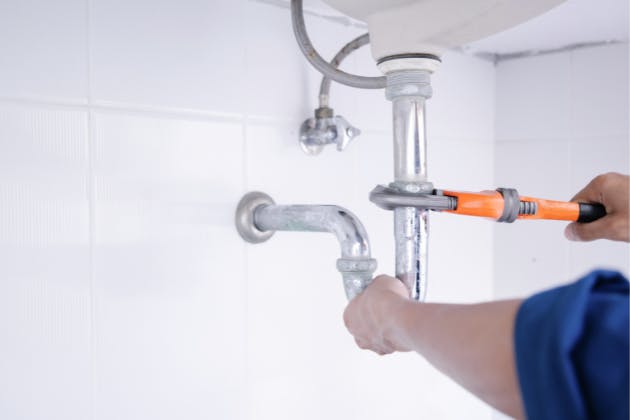Plumbing emergencies can happen without warning, and knowing how to respond can make the difference between a minor inconvenience and major property damage. Here’s a step-by-step guide on what to do during a plumbing emergency, so you can act quickly, protect your home, and ensure the situation is safely managed until professional help arrives.

What to Do in a Plumbing Emergency
1. Identify the Problem
Start by determining the type and source of the issue. Is it a burst pipe, a severe leak, a blocked drain, or an overflowing toilet? Quickly assessing the situation helps you take the right next steps and ensures your plumber has all the information they need to resolve the problem faster.
Look for water pooling, damp patches, or unusual noises. Check taps, toilets, and appliances for irregularities.
2. Shut Off the Water Supply
Turn off the water to stop further damage. For whole-house issues, use the main shutoff valve—usually found near the water meter or where the supply enters your home. For isolated problems (like a leaking tap or toilet), use the fixture’s local valve. Knowing the location of these valves ahead of time saves valuable minutes in an emergency.
3. Contain the Water
Use towels, buckets, or bowls to limit water spread. For small leaks, wrap the affected area with rags or plumber’s tape to slow the flow. These are only temporary fixes, but they help reduce damage to floors, furniture, and walls until your plumber arrives.
4. Drain the System
Once the water is off, open all taps to drain excess water from the system and relieve pressure. If a pipe has burst, prioritise opening the lowest tap in your home, this will help direct water away from the damaged area and minimise pressure in the system.
5. Switch Off Electrical Appliances
If water is near electrics or appliances, turn off the power at the consumer unit (fuse box) for safety. This is especially important for water heaters, washing machines, or areas with exposed sockets. Never touch electrics in a wet environment, safety comes first.
6. Avoid DIY Fixes
Resist the temptation to fix the problem yourself unless you’re confident and qualified. Poorly done DIY repairs often worsen the damage and lead to higher repair bills. Leave the technical work to professionals—your job is to manage the situation safely until they arrive.
7. Get Ready for the Plumber
While waiting, gather details: when the issue started, what areas are affected, and whether you've noticed any unusual noises, smells, or appliance errors. Clear the area of furniture and obstacles so the plumber can access the problem quickly. The more prepared you are, the faster the repair process.
8. Prevent Future Emergencies
After the crisis is resolved, take steps to protect your home long-term. Label your shutoff valves clearly, create a quick-reference guide, and schedule routine plumbing inspections. Early detection of wear and tear or hidden leaks can prevent emergencies altogether.
H2: Facing a Plumbing Emergency in Littleport, Ely, or Witchford?
Beach Plumbing and Heating is ready to help fast. Whether it’s a burst pipe, a leaking toilet, or a full system failure, we provide reliable emergency response and professional repairs. Call us now on 07455158585 or 01353362034, or use our contact form to get urgent assistance.


